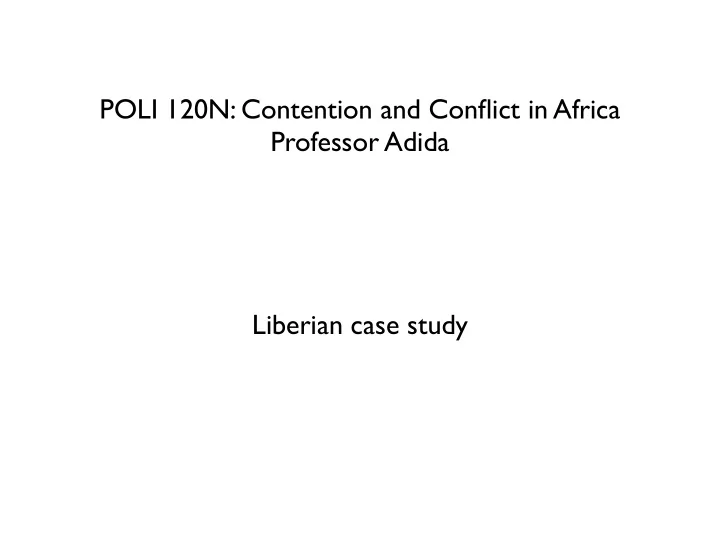

POLI 120N: Contention and Conflict in Africa Professor Adida Liberian case study
Final projects • Final week of class, 6 groups, 3 per class session, 20 minutes each • Structure • Background • Description of conflict • Explanation of conflict • Take-away • Graded on • depth of understanding of case • Ability to apply theories learned in class • Clarity (slides and delivery) • Originality (keep us engaged)
Background • Colonized by the American Colonization Society • First Black Americans arrived in 1822
mappery.com
Background • Colonized by the American Colonization Society • First freed American slaves arrived in 1822 • Liberia proclaimed Africa’s first independent republic in 1847 • Country’s motto: “The love of liberty brought us here” - applied only to settlers; native population brutalized • Source of settlers’ power: support from US and US corporations
Domination of Americo- Liberians • Settlers, aka Americo-Liberians, monopolized political power • Indigenous peasants “eked out meager living” (Berkeley)
Tubman, 1944-1971 • Graft and repression peaked under his rule: devoted more than 1% of national budget to the upkeep of presidential yacht • But also liberalized the system • Open-door policy • Unification policy
Tolbert, 1971-1980 • Tried to liberalize the political machinery, but not enough • April 12, 1980: Samuel Doe, master sergeant in the Armed Forces of Liberia, led a coup; disemboweled Tolbert, executed his cabinet • People’s Redemption Council (PRC): brutal rule, repression, terrorization of population; stole $300 million • Ethnic favoritism: Doe progressively filled the top positions with family friends and loyal confidants, all who shared Doe’s Krahn ethnicity • Appointed Mandingos to positions in rural government and granted them preferential business opportunities
Samuel Doe’s tyrannical rule • Populist policies • U.S. support (Cold War) Samuel Doe with US Secretary of State Weinberger, 1982
Turning against the Gio/Mano • After the flawed 1985 elections, a group of dissident soldiers slipped into Liberia from neighboring Sierra Leone, and staged an attempted coup • Led by Thomas Quiwonkpa, who had helped Doe in his coup 5 years earlier • Coup failed; Quiwonkpa tortured and killed • Quiwonkpa was ethnic Gio; Doe turned against the Gio and neighboring Mano for revenge
Charles Taylor’s rise • Supported the 1980 coup that Doe led against Tolbert • Worked in Doe’s administration until he was sacked for embezzlement • Fled to the U.S., then to Côte d’Ivoire, where he recruited... the Gio and Mano persecuted by Doe • Named his movement the National Patriotic Front (NPFL), and launched armed uprising in December 1989, leading the country into its first civil war. • By 1990, Prince Johnson, one of Taylor’s senior commanders, broke away and created his own Independent NPFL (INPFL), who controlled Monrovia and executed Doe
Liberia’s civil wars • First civil war (1989-1996) • Taylor proclaims himself President in 1990 • 1992-1996: Taylor vs. Johnson; Liberia a failed state • War ends in 1996 with ceasefire and elections • 1997 election • Taylor campaigned: “He killed my ma, he killed my pa, but I will vote for him”; Gained 75% of the vote: fear that war would resume if he lost • Purges of Krahn and Mandingo • Second civil war (1999-2003) • 1999: LURD appears in the North. • 2003: MODEL appears in the South • July 2003: Taylor controls only 1/3 of country; resigns, flees to Nigeria, is captured trying to flee into Cameroun
Taylor at the ICC NYT
An ethnic conflict Timeline Ethnic groups in conflict 1847-1980: political dominance of settlers (3%) vs. indigenous Americo-Liberians (95%) 1980: coup led by Sam Doe (Krahn) and Krahn/Gio vs. Americo- Thomas Quiwonkpa (Gio) Liberian 1980-1990: Doe tyrannical rule Krahn vs. Gio/Mano 1989-1997: Civil war, Taylor (Americo- Gio/Mano vs. Krahn Liberian) vs. Doe 1997-1999: Taylor elected Gio/Mano vs. Krahn 1999-2003: Civil war, LURD (Krahn/ Krahn/Mandingo vs. Gio/Mano Mandingo) vs. Taylor
The ethnic conflicts • A war of ancient ethnic hatred • The Americo-Liberians vs. the Krahns vs. the Gios Tim A. Hetherington/PANOS Pictures
Ethnic hatred argument: observable implications • Violence and conflict occur purely along ethnic lines; no crossing over. Different sides should be mono-ethnic • Evidence of historical conflict between groups
And yet... • Loyalty and violence did not always fall along ethnic lines • Samuel Doe may have been a Krahn, but Charles Taylor was not a Gio nor a Mano • No violent divisions among Liberia’s 16 ethnic groups before 1980: they frequently intermarried, traded with each other, coexisted peaceably (Berkeley)
If not ethnic hatred, then what? • Role of leaders: “All of Africa’s ethnic conflicts start at the top and spread downward” (Berkeley). • Role of poverty: By mid-1980s, only 1 in 4 Liberians had access to safe running water (only 6% in rural areas). Barely 1 in 4 adults could read or write. Infant mortality was ten times the American average. Life expectancy was 52 years. • Role of external forces: US looking for economic investment and political allies; Libya looking for power in SSA; France looking for business opportunities (timber) • Role of natural resources: iron-ore, timber, diamonds, gold • Role of political institutions/exclusion (Wimmer et al.; Roessler)
Roessler in action • Doe (Krahn) and Quiwonkpa (Gio) take over • Become rivals, Doe sacks Quiwonkpa and purges Gio; stacks government with Krahn/Mandingo • Taylor organizes Gio and Mano to overthrow Doe (triggers 1st civil war) • Taylor wins war and election, purges government of Krahn/Mandingo • Krahn/Mandingo organize to take over from Taylor (triggers 2nd civil war)
POLI 120N: Contention and Conflict in Africa Professor Adida Liberian case study
Recommend
More recommend